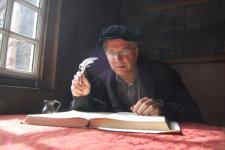I recently responded to some questions from a reporter. I thought you might find my answers interesting (and I have nothing else handy in my blog bucket).
How has your job changed the way you travel?
I do whatever is necessary at whatever cost to maximize the value of my time, like hiring taxis and local guides.
How much do you plan your trips in advance? (What do you leave to chance and what do you nail down beforehand?)
These days, because I’m committed to an intense research schedule, I book all my hotels in advance. Each day unfolds as I’m there. It’s really a fun challenge to envision each day’s work of a two-month trip, three months before departure, and lay out an itinerary where each overnight is right on.
What are some packing tips you’ve picked up?
Pack light.
What’s the one thing you won’t leave home without taking with you?
I’ll give you three: my laptop (with an extra battery), my iPod, and a little something to help me sleep.
What do you wear on the plane? Why? And what do you bring with you on the plane to make the ride bearable?
I wear a sweater and my noise reduction headphones. I’d rather fly coach with noise reduction headphones than business class without.
How do you deal with jet lag?
Leave home well-rested. For about the first three nights in Europe I use a quarter tab of Ambien when I wake too early to finish that night’s sleep.
What’s the first thing you do when you arrive at a destination to acclimatize yourself or get the bead on a place? How do you get your bearings?
I read my guidebook chapter about the place. (That also helps me sleep when struggling with jet lag.) I also like to simply get out and wander—slow, alone, head in the clouds—to just pick up the current flavor.
How do you find non-touristy spots?
I talk with locals about their favorites. The Moms and Pops who run the little B&Bs and guesthouses I recommend hear day in and day out what thrills and disappoints their guests. I vigorously pick their brains. But it’s important that I get beyond cronyism. People working for the tourist boards are worthless in this regard.
How do you approach local cuisine? Is it something you seek out (or find overrated?) How do you find good local restaurants? What are your thoughts on street food? What sorts of things do you look for to determine whether a street vendor is worth trying?
Places near markets, places with no English menus, and places with fast turnover are a good sign. Döner kebabs are my new fast, cheap, lunch option, washed down with a nice refreshing glass of ayran, a yogurt drink. But I want a kebab stand that does a brisk business. “Local cuisine” is often clichés that only tourists eat. Lately I’ve been careful to cut back here.
How much of your travel is on your own? What sorts of things have you learned to do when traveling solo? Do you have tips for other solo travelers? (Do you have tips relating to bars and restaurants in particular? Nightlife?)
Unless I’m filming or apprenticing a new researcher, I generally travel alone. I assume my readers are in bed by midnight. I use my evenings to check restaurants. I then eat a late dinner in my favorite restaurant find of the evening. Then I go home and input text into my laptop of what I learned that day. I can work 60 hard, long days in a row but only if I get 7 or 8 hours sleep a night.
How do you record and take notes on your trip while traveling? (Are there certain products you use? Do you schedule certain times of day that you take a moment to write observations down?)
I love my Moleskine notebooks. I feel like a human lint brush. I’m constantly collecting scraps of news, tips, and new ideas and then diligently working them into existing or new chapters as I input it all into my laptop.
How do you keep in touch with others while traveling? (products? times of day/ email? postcards?)
I deal with my email nearly every night—but only once a day. I haven’t sent a postcard for ages. I’ll never travel without the help of a mobile phone.
What sorts of tourist etiquette tips have you picked up along the course of your travels? Is there a way you’ve learned to approach locals that particularly effective? A type of attire? What would you absolutely avoid doing?
I don’t worry about what kind of flowers to bring or how to cross my legs. I am just genuinely respectful, curious, and positive with the people I encounter on the road. And I enjoy being received warmly. For people in the tourist industry in Europe, I just do my work with laser focus and if they appreciate that they work with me. If some big shot in the tourist board wants to have a long lunch with me, I tell him that I am committed only to my readers and I have one shot at updating the material in his city and I have no time for a social lunch. This just doesn’t make any sense to (and astounds) many of the bureaucrats I meet and deal with in Europe.





